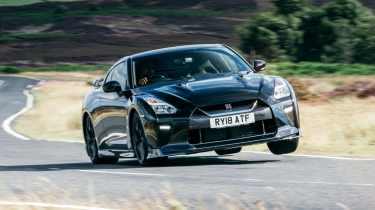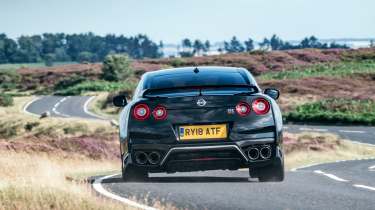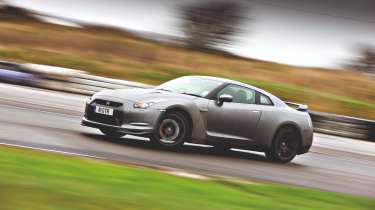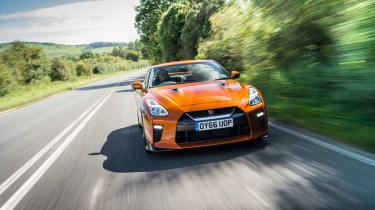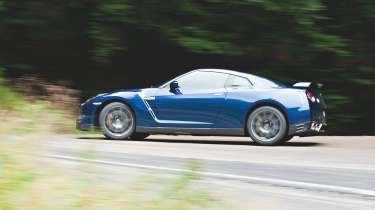Nissan GT-R (R35, 2009 - 2025) review – the Porsche 911 Turbo’s greatest rival
The R35 Nissan GT-R purveys a legendary status like few others. Bespoke, highly strung and intense, the R35 will live on as a high point in Japanese automotive engineering
Back in 2007 when the R35 Nissan GT-R first debuted in Japan, its facts and figures looked like something from a dreamscape – an ensemble of tech none doubted took the full seven years of development for Nissan to realise from approval to debut.
Its hardware tally was shocking (bespoke twin-turbocharged V6 engine, transaxle dual-clutch transmission, an active all-wheel-drive system that required two prop shafts and active differentials on both axles for total torque vectoring) – it seemed like Nissan might have gone too far, creating something synthetic and overly augmented.
It was criticised by some for its complex, tech-laden approach, and while there’s no doubt that some of its rivals felt more analogue, the performance its platform unlocked made it a groundbreaking machine. When it came out on top in evo Car of the Year 2008 against the Lamborghini Gallardo LP560‑4, Porsche 997 GT2 and Renault Sport Mégane R26.R, it was clear that Japan was doing something right.
‘The mighty Nissan GT‑R cannot be denied its victory,’ we said. ‘No, it didn’t ignite the fires of lust like the Alfa [8C] and Lambo. Its styling is perhaps an acquired taste. But, the truth is, there isn’t another performance car on the planet that’s as devastatingly cost-effective as the Nissan. It covers all the bases from four-seater GT to rocketship with breathtaking confidence. Head rules heart but, on this occasion, we wouldn’t have called it any other way.’
More reviews
Group tests
In-depth reviews
Reviews
- 2025 Nissan GT‑R Nismo Final Edition - Japan's 911 GT3 RS still has it
- Nissan GT-R Nismo (R35, 2014 - 2025) review – Godzilla on steroids is a Japanese icon
- Nissan Skyline GT-R Hakosuka (1971): origin of the species
- Nissan Skyline GT-R R32 - review, history, prices and specs
- Nissan GT-R review - The GT-R has never been more usable, yet it's still blisteringly fast
Sixteen years later the R35 GT‑R is still a force to be reckoned with, and in today’s world of hybridised powertrains, electric power steering and wall-to-wall driver assistance systems, it’s the Nissan that feels like the analogue option, sending buckets of uncorrupted feedback into the cabin. Finally, in August 2025, the final Nissan GT-R was built and delivered, ending a run of over 40,000 cars.
History
The GT-R served for many years, picking up numerous upgrades along the way, as is the Japanese way, as you’d hope for a car that would see opposition from no less than three generations of Porsche 911 Turbo. Changes were made for almost every one of its 13 model years, from tiny spec changes, to special editions, to wholesale facelifts. It’s difficult to count them all but we’ll summarise the main moments of change as best we can.
In 2009 the GT-R got a small boost in power up to 478bhp. In 2011, it was lightly facelifted with LED dayrunning lights, a revised front apron and new light clusters, with a boost to 523bhp and added chassis focus under the skin. Then in 2012, it got even more potent, with a jump to 542bhp, while the suspension was revised again.
These performance bumps came from incremental adjustments to the exhaust, inlet, cooling, timing, fueling and more. For 2014, the R35 GT-R was fettled again but while no more power was on the menu, new front and rear lights modernised the GT-R’s look for its sixth year on sale.
In 2017 Nissan gave the R35 GT-R the biggest facelift since its launch, visually inside and out and under the skin. Redesigned front and rear facias improved airflow over the car as well as key component cooling, while the chassis structure was stiffened by five per cent.
Under the bonnet, the boost pressure was dialled up, for a relatively mild boost to 562bhp, at a headier 6800rpm. All GT-Rs up to this point peaked at 6400rpm. Max revs were also increased, from 7000 to 7100rpm. The 2017 GT-R was a more refined, upmarket GT-R, with revisions to the transmission aimed at smoothness, better materials and a more upmarket design inside and reduced NVH. This was a heavier GT-R as a consequence, too. While the GT-R received new, more efficient, turbochargers in 2019, not much else changed until another significant visual facelift in 2024 – a version of the GT-R never meant for Europe.
Special versions of the GT-R were coming out of the gates almost from day one. The SpecV was our first taste of a more extreme track-focused GT-R, that was lighter, with a more aggressive exhaust and racier Rays wheels. Subsequent Track Edition models joined the main lineup and followed a similar formula, offering a stiffer, more focused flavour of GT-R but still sitting under the full-on GT-R Nismo flagship that first arrived in 2014. In the end, over 40,000 Nissan GT-Rs were built and sold over the course of a near 18-year run on sale. A product of its time, any unlikely successor is sure to feature some form of electrification. The R35 GT-R was novel on arrival and surely, its like won’t be repeated.
Nissan GT-R on the evo Eras: the 2010s test
‘You certainly feel the softened suspension compared with earlier models. The distinctive row of plastic rocker switches in the GT‑R’s monolithic centre console (with its digital screen capable of displaying individual temperatures and pressures for engine and gearbox oil, g-forces and endless info besides) enable you to flick between modes for the transmission, stability control and three levels of damping force.
‘In Comfort mode, it’s compliant to the point of being a little too wallowy on these open, bucking Yorkshire roads. The standard middling setting is still very much on the soft side, while the stiffest R mode is much more hardcore, if not quite the clenched fist of the highly specialised Nismo version last driven in evo 315.
‘It takes a little while to acclimatise to the way the GT‑R does things. But once you’ve tuned yourself into its slightly remote but responsive steering, the way it moves upon its suspension, and anticipate the all-wheel-drive system cleverly shuffling torque around like a croupier, everything clicks. It is savagely fast. I can’t imagine how it felt back at the dawn of the 2010s. It feels so much quicker than the cars in the ’00s test, if not quite as mind-bending as modern-day machinery.
‘The way the GT‑R stops and turns is as remarkable as the way it goes; more so, in fact. The brakes are as responsive as they are powerful, and the way the R35 can tuck its bluff nose into a corner, rail around it with the force of a centrifuge and blast out of it on exit – frequently with a mild kick of oversteer from its rear-biased AWD system – is like nothing else.
'And you’re very much a part of the process: there’s mass to manage, steering inputs to marshal throughout each phase of a corner, it can become a little unsettled over bumps, and everything’s coming at you so quickly. It’s totally absorbing, and addictive. Contrary to contemporary pub chat, it doesn’t drive itself.
‘It’s a big car, at more than 4.7m long and 1.3m tall. The R35 was one of the first performance cars to seemingly cheat physics, with more agility than such a portly machine has any right to possess; something other marques have worked to learn since. Sam points out that while the 14MY GT‑R’s 1740kg was heavy for the 2010s, it’s 35kg lighter than a current BMW M4 Competition xDrive. And nearly 700kg lighter than the new hybrid M5…’ – James Taylor, evo deputy editor, who tested the GT-R on our evo Eras: the 2010s test.
What we said
‘The first couple of proper corners reveal that the seemingly minor chassis upgrades have had quite a profound effect. The first thing of note is that the steering is more positive; there’s no hesitation, no taking up of inertia-laden slack, you simply turn the wheel and the nose darts for the apex. Then you thread the car through a quickfire direction change, left into right over alternate cambers and, although you’re pushing on, the car changes tack quickly and cleanly.
‘The revised front suspension geometry, adjusted rear roll- centre and the new tyres have dramatically affected the feel and nature of the GT-R’s dynamics. It feels like all the slack has been taken out and the mass of the car is held in tight check – it no longer feels as heavy or bulky. It’s reassuringly planted and more responsive, and this makes it a simpler, purer experience. You lean on the front into turns and pick up the throttle as soon as you dare, and if you’re really keen the back end might edge a fraction wide on the exit, which a small twist of steering corrects.
‘The current Nordschleife lap time for the GT-R is 7min 26sec (which is astonishing) and the teasing data-sheet we were shown suggested the MY11 GT-R would still be in the twenties. I think that’s too conservative. The combination of much better turn-in and terrific roll and pitch control, plus the extra power, must surely get the GT-R into the teens. There’s a real sense of dynamic finesse about the GT-R now, a feeling that the clever systems are more at work in the background and pure driver interaction has come to the fore.’ – John Barker, evo 150, December 2010.
‘Perhaps the clearest indication of how this GT-R has subtly shifted its character is that on a bumpy, twisting piece of Belgian B-road, I find myself using the R setting for the Bilstein DampTronic suspension to keep everything tied down and free from float. In previous iterations of the R35, the R mode was the preserve of silky smooth, freshly laid circuits, and in some cases Comfort mode was all you needed for quick road driving. The increased calmness is actually a bonus through the high-speed corners of Spa-Francorchamps.
‘The familiar balance of the ATTESA E-TS four-wheel-drive system is still there, and with trail braking it is more obvious than on the road, but it’s definitely not as aggressive as before. This makes the car calmer mid- corner but also a little less instantly adjustable than some previous GT-Rs. If you think it sounds like there is now a bit more of the ‘GT’ and a little less of the ‘R’ in this version of the GT-R, you’re right.
‘This is the standard GT-R, which can be purchased in several different trim levels. Then there’s the Track Edition with enhanced body rigidity, 20-inch Rays alloys, uprated suspension and a carbon rear spoiler. At the top of the tree, the Nismo GT-R. This clear three-pronged attack is a reflection of how the R35 has been developed and tweaked in recent years, teasing out and magnifying various facets of the original. In some ways it makes sense to allow customers to choose the type of GT-R they want, but there is a slight feeling that the Swiss Army knife has been split up into a rack of individual tools.’ – Henry Catchpole, evo 224, August 2016.
Nissan GT-R (R35, 2009 - 2025) specs
| Nissan GT-R (07-10) | Nissan GT-R (10-12) | Nissan GT-R (12-16) | Nissan GT-R (17+) | |
|---|---|---|---|---|
| Engine | V6, 3799cc twin turbo | V6, 3799cc twin turbo | V6, 3799cc twin turbo | V6, 3799cc twin turbo |
| Max power | 478bhp @ 6400rpm | 523bhp @ 6400rpm | 542bhp @ 6400rpm | 562bhp @ 6800rpm |
| Max torque | 433lb ft @ 3200rpm-5200rpm | 448lb ft @ 3200-5800rpm | 466lb ft @ 3200-5800rpm | 467lb ft @ 3300-5800rpm |
| Transmission | Six-speed DCT, ATTESA ET-S four-wheel drive, rear LSD, VDC-R | Six-speed DCT, ATTESA ET-S four-wheel drive, rear LSD, VDC-R | Six-speed DCT, ATTESA ET-S four-wheel drive, rear LSD, VDC-R | Six-speed DCT, ATTESA ET-S four-wheel drive, rear LSD, VDC-R |
| Weight (kerb) | 1740kg (279bhp/ton) | 1735kg (301bhp/ton) | 1740kg (311bhp/ton) | 1785kg (314bhp/ton) |
| 0-62mph | 3.5sec | 2.7sec | 2.7sec | 2.7sec |
| Top speed | 197mph | 197mph | 199mph | 201mph |
| Price new | £56,795 | £70k+ | £75k+ | £80k+ |
| Price now | From £30k | From £30k | From £40k | From £60k |
What to pay and buying guide
Despite its highly strung running gear, the R35 has proven to be a reliable machine given proper maintenance. This reliability is one of the primary reasons it’s become such a popular tuning platform, with the stock engine said to be able to withstand over 800bhp should you have the turbochargers to support it. The once cutting-edge dual-clutch transmission is robust too.
Cars built before 2011 are known to have more issues than later examples, however. ABS pump failure, smoke on start-up and under acceleration, and bellhousing rattling are things to look out for when buying, as is excessive wear on the seat bolsters. A health check and regular servicing with a reputable specialist such as Litchfield will stand you in good stead.
Just a few years ago the GT-R was among the most affordable cars offering supercar levels of performance that you could find in the classifieds. Prices have since risen, but even so the entry point is just £34,000. You’ll need to be especially careful at this end of the market, as the cheapest cars may have attracted owners less inclined to pay for proper maintenance; poorly modified examples are also far from uncommon.
Safer territory is upwards of £40,000 for a car in factory specification (473bhp in 2008, 523bhp from 2010). Facelift cars (2012, 542bhp) with around 60,000 miles can be found from £45,000. At the upper end of the market is the Nismo version in £130,000 territory, but if you’re looking for a standard GT-R, the very latest, 2021-registered examples on 10,000 miles or so can be had from around £85,000. – Sam Jenkins
